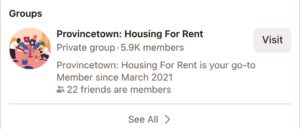PROVINCETOWN — Someone in the Facebook group “Provincetown: Housing for Rent” called finding housing here “an impossible dream.” The page is a trove of tales of housing plans that have fallen through. And when one man wrote “luxury on the water is what I’m looking for,” the response was, “Oh, honey.”
It’s unclear whether the social media platform is solving people’s housing issues or helping to foment political action. But it does offer a window on a problem whose solutions are not in immediate view.
 The possibilities posted are tantalizing but often impractical — someone advertised a house swap: you get to stay in their Boulder, Colo. home for a few months in exchange for letting them stay in your Provincetown abode. Selfies are captioned with biographical information. One person is the proud owner of “a small deaf chihuahua”; another is a floral photographer; and, despite the boa he’s wearing in his picture, a third notes he is straight. Most are requests for housing. “Likes” often correspond to good looks.
The possibilities posted are tantalizing but often impractical — someone advertised a house swap: you get to stay in their Boulder, Colo. home for a few months in exchange for letting them stay in your Provincetown abode. Selfies are captioned with biographical information. One person is the proud owner of “a small deaf chihuahua”; another is a floral photographer; and, despite the boa he’s wearing in his picture, a third notes he is straight. Most are requests for housing. “Likes” often correspond to good looks.
A handful of real estate brokers are in the group, along with people who were born and raised in Provincetown, year-round transplants, college students hungry for a job that will fund a big gay summer, and the occasional family hoping to move out here full-time. There are nearly 6,000 members (full disclosure: this writer is one of them and did find a room through the group).
The group was founded in 2013 by Adam and Ben Berry, Provincetown residents who run the Peregrine Theatre Ensemble. It is limited to those seeking seasonal and year-round rentals, not weekly or monthly vacation stays. To join, all one must do is click a button and more or less correctly answer what year the Pilgrims first landed in Provincetown. (Hint: the answer is not 1492, though that is apparently a popular one.)
Most groups of this kind — for Northampton, Providence, or Burlington, Vt. — function as standard informal marketplaces. But the Provincetown group has flair. The selfies, exclamation points, and sassy quips that make it different from most housing market groups could be chalked up to Provincetown’s small size and village vibe. Or they might arise from something trickier: the lack of housing on offer here.
The group’s tone is more pleading than personal. In other housing groups, people post available units; in the Provincetown group, that doesn’t happen much. People present their cases and ask if there are units available. Then, usually gently, commenters respond: not really.
Good Neighbors
“Provincetown: Housing for Rent” reveals how neighbors helping neighbors can come up short. Joining the group can feel like sitting down at a restaurant with a very friendly wait staff but no kitchen.
In her book Good Neighbors, Harvard professor Nancy Rosenblum writes about the image of America as a nation of people performing acts of neighborly kindness for one another. She writes that, while well-intentioned, this view can sour: “When government and politics disappear from view as they do, we are left with the not-so-innocuous fantasy of ungoverned reciprocity as the best and fully adequate society.”
Rosenblum lives part-time in Truro. Since local government is, by nature, responsible and responsive to “property owners and not people looking for housing,” she says, she sees the Facebook group as “a good response to an impossible situation.”
In mid-May, an unusual post cropped up in the Facebook group: a call to “organize a group of workers for housing rights in our beautiful little town.”
The post was by Juniper James, a 34-year-old trans woman who, since 2016, has spent her summers working in Provincetown.
“The local government is obviously more interested in tax revenue than they are in providing security for the local workforce,” James wrote in the post, “but if we work together we can effect change!”
James spent the summer of 2019 living in Provincetown — in her car. This despite the fact that she was working two jobs, at Loveland and Pop + Dutch. “I was making more money than I’ve ever made in my life, and I still couldn’t swing it,” she said.
She feels “weird” about relying on Facebook for community organizing. “It’s a double-edged sword,” she said. “Facebook creates a public forum, but the company now owns what everyone has said in that public forum. It’s disconcerting, but it’s also hard not to rely on it for communication.”
‘The Saddest Thing’
Jennifer Cabral spends a lot of time on Facebook. Too much time, she admits. She says she’s not alone, though, especially in the winter. That’s when people here flock to Facebook for connection, she said.
Cabral is the moderator for “Provincetown: Housing for Rent.” That means she has the ability to silence comments and add and remove users, and her posts are flagged with a special tag.
Cabral, the daughter of the late Reggie and Meara Cabral, spent her summers as a young adult working odd jobs in town. She describes the housing crisis in Provincetown as “a bucket with holes in it.”
“You try to patch the holes you can patch,” she said. “But it’s always going to be leaking. So, you have to always be filling it. You will never solve the housing problem. You can only tackle it and keep tackling it.”
The Facebook group could be a patch. Cabral is glad the group exists — it has helped many people find housing — but she says it’s sad that the group exists in the lopsided way that it does, with people always asking for space and others rarely able to provide it.
“Being in the group is like staring at this huge, gaping need,” she said.
She paused for a while.
“It’s so sad,” she said. “It really is. It’s the saddest thing.”
Editor’s note: Because of a reporting error, an earlier version of this article incorrectly said that Jennifer Cabral was born in Provincetown. She was born in Ft. Lauderdale, Fla.
 Moderator Mary-Jo Avellar, who appoints FinCom members, said, “He’s eminently qualified, having been the town manager. I’m obligated to appoint the most qualified person, and I think that is what I did.”
Moderator Mary-Jo Avellar, who appoints FinCom members, said, “He’s eminently qualified, having been the town manager. I’m obligated to appoint the most qualified person, and I think that is what I did.”